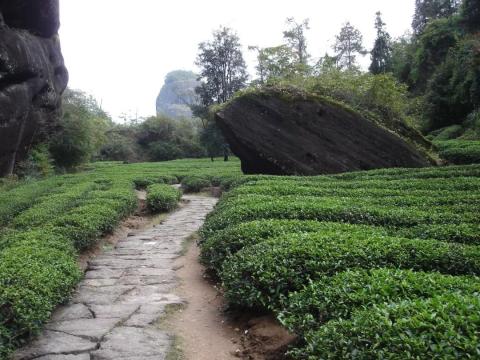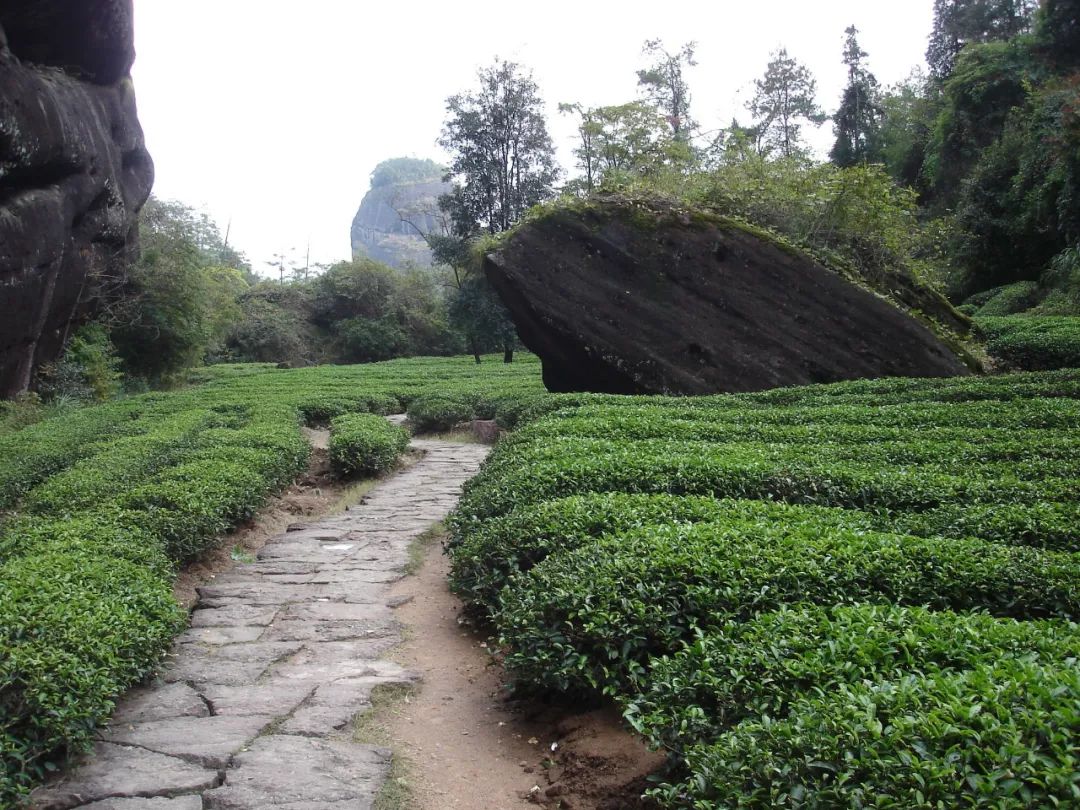
Time:2006year11month23day
Location:Wuyishan, Nanping City, Fujian Province
Jingxiang Travel Notes Chapter 31丨Jiuqu River at the foot of Wuyi Mountain
When you come to Fujian, you will come to the hometown of tea. When you come to Wuyi Mountain, you will definitely be able to see the mother trees of Dahongpao and hear the story about the origin of Dahongpao’s name. To me, it is just a kind of tea. Shennong also uses tea to detoxify! These are all made-up stories. If you eat poisonous weeds such as poisonous mushrooms, try using tea to detoxify them!
If human beings need to live with ideals, they must set an example to pursue. In order to set an example for future generations, people will make up some magical stories or exaggerate someone's deeds to infinite magnification. For example: In order to promote loyalty and allow more talented people to serve the ruler, Guan Yu was promoted from a military general to a martial saint, and then continued to magnify into Emperor Guan, and even had a relationship with the God of Wealth; maybe Peng Zu lived a long life, But did you really live to be 800 years old? Don't tell me, this Wuyi Mountain is really related to Peng Zu.
According to historical records, during the reign of Emperor Yao, Peng Zu's two sons, Peng Wu and Peng Yi, lived in seclusion in Chong'an Southwest Township, on the eastern foot of the mountain. Because local floods often occurred, the two brothers excavated mountains and dug canals to divert floodwaters. In order to commemorate them, people at that time named the small earth and stone hills they piled up when digging the canal as the "Tianlong Mountain". “ Wuyi Mountain ” .
This story is just like "The Foolish Old Man Moved the Mountain", it is just a fable. Just like Li Tang wanted to find a prominent ancestor and named Li Er the Supreme Lord. Wuyi Mountain is so famous, it must be given a glorious history. Only then are they willing to give up.
However, the tea trees all over the mountain are real:

After walking through this tea forest, I saw a temple.

In fact, most of the legends mentioned above were spread by religious places. Therefore, I am not very keen on going to religious places to join in the fun, but I think Jiuqu River is worth a visit.
Jiuquxi, located in the rocky valley of Wuyi Mountain Peak, is a stream at the southwest foot of Huanggang Mountain, the main peak of Wuyi Mountains. Because it has three bends and nine bends, it is named Jiuquxi.

The highlight of the tour here is sightseeing by bamboo raft. Look, the bamboo rafts of the tourism company are already waiting there in neat rows.
Bamboo rafts are a means of transportation that are derived from shoals that are inaccessible to boats. However, as a new manifestation, tourists do not care about whether comfortable boats can pass through Jiuqu River smoothly, because they are basically rushing here. Came on a bamboo raft. So there are boatmen who have been supporting bamboo rafts for a long time, and there are also female boatmen among them:

When I was a kid, I did a lot of things. In addition to poking hornets' nests, I also paddled. So I chose an area where the current was not strong, asked the boatman for a pole, and started paddling. To be honest, I really don’t dare to be a hero in a place where the water is in danger!

No, quickly return the pole to the boatman and find a stool to sit down obediently, because we have reached a place where the water flow is fast.
The river in this section is relatively wide, and the bamboo rafts passing by in a mighty manner have become a scenery.

The total length of Jiuqu River is about 9.5 kilometers and covers an area of 8.5 square kilometers. Each meander has a different landscape painting meaning. The big stone on the shore told me that this is the fifth song.

It is said that there are many scenic spots in each song, but the bamboo raft I took did not have a tour guide, and I didn’t know if I was already at a certain scenic spot. In fact, many scenic spots are imaginary. Look at this double breast peak. I really can’t tell it unless others tell me:

However, some landscapes require no imagination, they are just there objectively, such as the hanging coffins on the cliffs on both sides.

Like sky burial and water burial, hanging coffin burial is also an ancient form of burial. In fact, from a scientific point of view, sky burial and burial are the most environmentally friendly. Sky burial allows humans to return to the food chain, while burial returns to the earth to enhance soil fertility. The least environmentally friendly option is cremation. However, human customs and habits will turn a large amount of land into mountain tombs for burial, so cremation has to be the most environmentally polluting method.
Hanging coffins do not take up any land, and are buried on cliffs that cannot be used by humans. Of course, their original starting point was definitely not for environmental protection.

However, what is interesting is that the hanging coffin here is not the coffin we are usually familiar with, but a boat coffin shaped like a fishing boat. In these caves, there are still more than ten hanging coffin remains. After carbon 14 testing, two ship coffins were found to be more than 3,000 years old. The turtle-shaped wooden plates buried with them are relics with the characteristics of Shang and Zhou bronze culture.
At that time, the people here could not even be called "Southern Barbarians", they should be ancient Yue people. Boats are an indispensable tool in the life of the ancient Yue people. Putting the deceased into a boat-shaped coffin is a sign of respect for the deceased. Out of admiration for the mountains, they placed the deceased in the place closest to the "god" so that they would not be disturbed by the world and thus better protect future generations. This is completely different from the concept of "rest in peace in the grave".
Culture is a wonderful thing, especially taboos. Things you think are unlucky may be considered good luck by others. In a certain place, "four" is a homophone for "happiness", so "4" is used for license plates and mobile phone numbers. However, most Han people believe that "four" is a homophone for "death", so "4" is not used for license plates, mobile phones and even floors. People who use "4" are not dead, and we still have people who are unhappy if we don't use "4". But since you live in that place, you must respect the local customs and habits.
Preview of the next article: After the Wannan Incident, a group of captured New Fourth Army soldiers were imprisoned in Shangrao City, Jiangxi Province, and the revolutionary heroes were subjected to inhuman torture. Please pay attention to the next article "Shangrao Concentration Camp".
